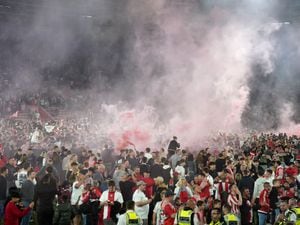Meet Wolves' longest-serving managers
Wolves boss Kenny Jackett is the 17th longest-serving manager in the country - and there's a team's worth in front of him for the amount of service at Molineux.











Of the 28 permanent chiefs Wolves have had since they were formed in 1877, Jackett stands 12th with nearly three years at the helm, writes Craig Birch.
When their life began, the team was selected by a committee, where the club secretary held the same powers and role that Jackett has today.
George Worrall was the first, for seven years and a eight months from August 1887 to May 1885, with Jack Addenbrooke replacing him that August.
The latter is still the longest-serving boss in Wolves' history, with a reign that went on for a whopping 36 years and 10 months.
Addenbrooke led Wolves to the FA Cup twice, while they were also runners-up on three occasions. It's a tenure that will almost certainly never be repeated.
They broke from the 'secretary' tradition to appoint their first full-time manager upon his exit in June 1922, with George Jobey picked.
He lasted nearly two years before Albert Hoskins was brought in for the same amount of time, while Fred Scotchbrook lasted just over a year.
Jobey had taken the club into the Second Division as champions in 1924 and when Major Frank Buckley arrived in July 1927, they rose again.
His 15 years and eight months work saw the club reach the First Division, going up as champions and finishing runners-up at the new level twice.
1, Jack Addenbrooke (August 1885-June 1922) 35 years 10 months.
2, Stan Cullis (June 1948-September 1964) 16 years three months.
3, Major Frank Buckley (July 1927-March 1944) 15 years eight months.
4, George Worrall (August 1877-May 1885) Seven years eight months.
5, Bill McGarry (November 1968-May 1976) Seven years six months.
6, Graham Turner (October 1986-March 1994) Seven years five months.
7, Mick McCarthy (July 2006-February 2012) Five years seven months.
8, Ted Vizard (April 1944-May 1948) Three years 11 months.
9, Dave Jones (January 2001-November 2004) Three years nine months.
10, Ronnie Allen (September 1965-November 1968) Three years two months.
11, John Barnwell (November 1978-January 1982) Three years two months.
A 4-1 defeat to Portsmouth at Wembley saw them lose the 1939 FA Cup final, but they did win the 1942 League 'War' Cup.
For the first time in the competition's history, the latter was decided over a two-leg final. Wolves won 6-3 on aggregate, after a 2-2 draw in the first game.
With World War Two still going on, Ted Vizard came on board in April 1944, leading them to third in the first 'peace time' season of 1946-47.
Come the summer of 1948, his assistant would take charge having been a popular former player himself. It was the one and only Stan Cullis.
He would go on to become the club's most successful manager and make Wolves the best team in the country and, arguably, the world.
Three First Division titles, two FA Cups and one Charity Shield also came along with the first foray into European football, after what is now the Champions League was first formed.
He nearly won English football's first 'double' in 1960, only for Burnley to pip Wolves to the post for the title by a point after Cullis' side had already won the FA Cup.
The powers-that-be looked to have taken leave of their senses when he was sacked in September 1964 and the club were relegated that season.
Andy Beattie was in charge when they went down and left in September 1965, with Ronnie Allen taking them back up in 1967 as runners-up during his three years and two months in charge.
Another purple patch came under Bill McGarry, who walked out on First Division rivals Ipswich Town to take over from the sacked Allen in November 1968.
His seven-and-a-half year reign saw cup competition provide the silverware, with two trophies and a UEFA Cup final during his time.
He won the old 'Texaco Cup' in 1971, before losing the European decider to Tottenham Hostpur 3-2 on aggregate after games at Molineux and then White Hart Lane.
But as Dave Wagstaffe, Mike Bailey and Derek Dougan began to fall away, so did the team. McGarry was axed when they were relegated in 1976.
His No 2, Sammy Chung, took over and restored them to the First Division at the first attempt, later making way for John Barnwell in November 1978.
But it was Barnwell who delivered Wolves' last major trophy in 1980, winning the League Cup for a second time with a 1-0 win over Nottingham Forest.
It proved to the club's last telling impact at the top level, as Wolves went into almost-terminal decline under the ownership of the Bhatti brothers.
Barnwell resigned and the team were relegated again under Ian Greaves, although Graham Hawkins did take them back into the top-flight.
He left after they went down again, with former Manchester United boss Tommy Docherty later shown the door as they headed for three relegations in a row.
McGarry lasted just 61 days of his second spell before falling out with the Bhattis, with chief scout Sammy Chapman pushed into the role. Brian Little had a spell as caretaker after he left.
It was Graham Turner's appointment that dragged Wolves off their knees again, overseeing two promotions and the Sherpa Van Trophy win at Wembley in 1988.
Sir Jack Hayward bought the club and vowed to restored them to the top-flight again, with Turner removed for former England coach Graham Taylor in March 1994 after a solid near eight-year stint.
Taylor, Mark McGhee and Colin Lee all spent Sir Jack's millions and failed to deliver, before Dave Jones got it right through the play-offs in 2003.
They were relegated after one season in the Premier League and Jones was sacked in November 2004, with another former England chief in Glenn Hoddle named as his successor.
He stepped down in May 2006 after making Wolves the ultimate 'draw specialists.' They took a point from 34 of his 76 games in charge, spanning over two seasons.
Mick McCarthy arrived and presided over Wolves' most productive era of the millenium, taking them up as champions and keeping them in the Premier League for two campaigns.
A 5-1 Black Country derby defeat at home to West Brom got him the boot the next day, with first-team coach Terry Connor taking over in February 2012.
Connor, the ill-fated Stale Solbakken and the equally-disastrous Dean Saunders couldn't prevent a 'double dip' relegation, with Jackett arriving in May 2013 as Wolves began life in League One.
Today's answer to Turner? Most probably. And he's having the same problem in restoring former glories. Time does fly in football.





